人类行为对环境的影响 英文版
- 格式:ppt
- 大小:1.62 MB
- 文档页数:68
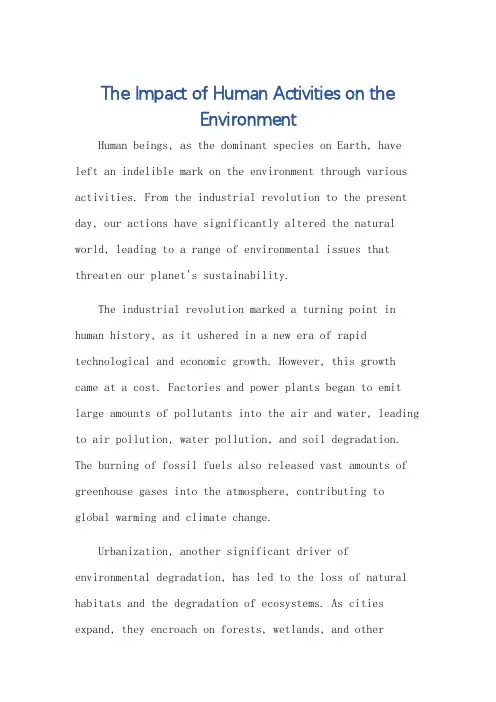
The Impact of Human Activities on theEnvironmentHuman beings, as the dominant species on Earth, have left an indelible mark on the environment through various activities. From the industrial revolution to the present day, our actions have significantly altered the natural world, leading to a range of environmental issues that threaten our planet's sustainability.The industrial revolution marked a turning point in human history, as it ushered in a new era of rapid technological and economic growth. However, this growth came at a cost. Factories and power plants began to emit large amounts of pollutants into the air and water, leading to air pollution, water pollution, and soil degradation. The burning of fossil fuels also released vast amounts of greenhouse gases into the atmosphere, contributing to global warming and climate change.Urbanization, another significant driver of environmental degradation, has led to the loss of natural habitats and the degradation of ecosystems. As cities expand, they encroach on forests, wetlands, and othernatural areas, displacing wildlife and disrupting ecological balances. The construction of roads andbuildings also leads to soil erosion and water pollution. Agricultural activities, particularly intensive monoculture farming and the excessive use of fertilizers and pesticides, have had a devastating impact on the environment. These practices have depleted soil nutrients, contaminated water sources, and destroyed habitats, leading to a decline in biodiversity and the loss of critical ecosystem services.The impact of human activities on the environment is not limited to local scales. Global trade and the movement of people and goods have had far-reaching consequences for the planet. For instance, the overexploitation of resources in developing countries has led to deforestation, soil erosion, and biodiversity loss. At the same time, the disposal of waste in other countries has created environmental problems that transcend national borders.The environmental impact of human activities is also reflected in the rising levels of plastic pollution. The widespread use of plastic products has led to theaccumulation of millions of tons of plastic waste in our oceans, rivers, and landfills. This plastic waste not only poses a threat to wildlife but also contaminates our food and water supplies, posing a serious risk to human health. In conclusion, the impact of human activities on the environment is profound and multifaceted. From industrial pollution to urbanization, agricultural practices, and global trade, our actions have had devastating consequences for the natural world. To address these issues and ensure a sustainable future for ourselves and our planet, it is crucial that we adopt environmentally responsible practices and policies that prioritize the protection and restoration of our environment.**人类活动对环境的影响**人类作为地球上的主导物种,通过各种活动在环境上留下了不可磨灭的印记。
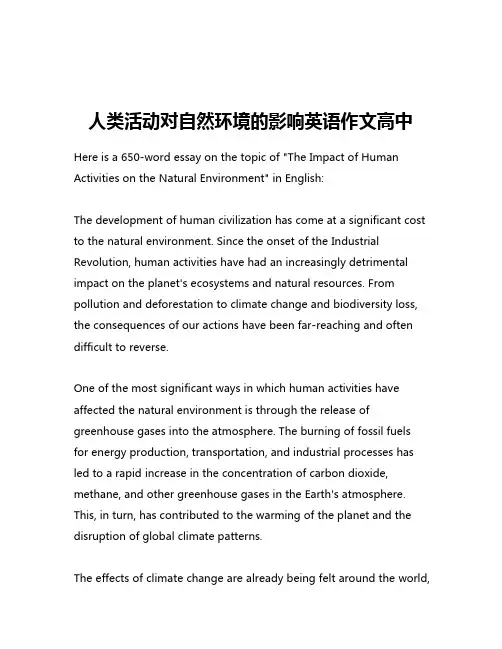
人类活动对自然环境的影响英语作文高中Here is a 650-word essay on the topic of "The Impact of Human Activities on the Natural Environment" in English:The development of human civilization has come at a significant cost to the natural environment. Since the onset of the Industrial Revolution, human activities have had an increasingly detrimental impact on the planet's ecosystems and natural resources. From pollution and deforestation to climate change and biodiversity loss, the consequences of our actions have been far-reaching and often difficult to reverse.One of the most significant ways in which human activities have affected the natural environment is through the release of greenhouse gases into the atmosphere. The burning of fossil fuels for energy production, transportation, and industrial processes has led to a rapid increase in the concentration of carbon dioxide, methane, and other greenhouse gases in the Earth's atmosphere. This, in turn, has contributed to the warming of the planet and the disruption of global climate patterns.The effects of climate change are already being felt around the world,with rising sea levels, more frequent and severe natural disasters, and changes in weather patterns that are threatening the livelihoods of millions of people. These changes are also having a profound impact on the natural world, with many species of plants and animals facing the risk of extinction due to habitat loss, changes in temperature and precipitation, and other environmental stressors.Another major impact of human activities on the natural environment is the degradation and destruction of ecosystems, particularly through deforestation and urban development. The clearing of forests for agricultural land, logging, and the expansion of human settlements has led to the loss of vast swaths of natural habitat, with devastating consequences for the plant and animal species that depend on these environments.The loss of biodiversity is a particularly concerning issue, as the world's ecosystems rely on a delicate balance of species to function properly. When this balance is disrupted, it can have cascading effects that can be difficult to predict or control. For example, the decline of pollinator species such as bees and butterflies can have far-reaching impacts on the productivity of agricultural systems and the overall health of ecosystems.In addition to these broad, global impacts, human activities can also have more localized effects on the natural environment. Pollutionfrom industrial processes, agricultural runoff, and urban waste can contaminate air, water, and soil, with serious consequences for the health of local ecosystems and human communities. The overexploitation of natural resources, such as overfishing or the unsustainable extraction of minerals and fossil fuels, can also lead to the depletion of these resources and the disruption of the natural systems that depend on them.Despite the significant challenges posed by the impact of human activities on the natural environment, there is reason for hope. In recent years, there has been a growing awareness of the need to adopt more sustainable practices and to take steps to mitigate and adapt to the effects of climate change and environmental degradation. Governments, businesses, and individuals are increasingly taking action to reduce greenhouse gas emissions, protect and restore natural habitats, and promote more sustainable practices in areas such as agriculture, energy production, and transportation.However, much more needs to be done to address the complex and interconnected issues that are threatening the health of our planet. This will require a concerted effort from all sectors of society, as well as a fundamental shift in the way we think about and interact with the natural world. By embracing a more sustainable and environmentally-conscious approach to development and resourceuse, we can work to minimize the impact of human activities on the natural environment and ensure a brighter, more sustainable future for generations to come.。
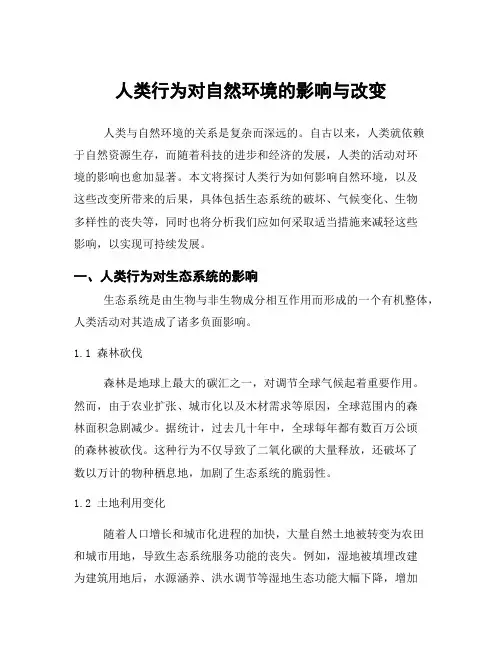
人类行为对自然环境的影响与改变人类与自然环境的关系是复杂而深远的。
自古以来,人类就依赖于自然资源生存,而随着科技的进步和经济的发展,人类的活动对环境的影响也愈加显著。
本文将探讨人类行为如何影响自然环境,以及这些改变所带来的后果,具体包括生态系统的破坏、气候变化、生物多样性的丧失等,同时也将分析我们应如何采取适当措施来减轻这些影响,以实现可持续发展。
一、人类行为对生态系统的影响生态系统是由生物与非生物成分相互作用而形成的一个有机整体,人类活动对其造成了诸多负面影响。
1.1 森林砍伐森林是地球上最大的碳汇之一,对调节全球气候起着重要作用。
然而,由于农业扩张、城市化以及木材需求等原因,全球范围内的森林面积急剧减少。
据统计,过去几十年中,全球每年都有数百万公顷的森林被砍伐。
这种行为不仅导致了二氧化碳的大量释放,还破坏了数以万计的物种栖息地,加剧了生态系统的脆弱性。
1.2 土地利用变化随着人口增长和城市化进程的加快,大量自然土地被转变为农田和城市用地,导致生态系统服务功能的丧失。
例如,湿地被填埋改建为建筑用地后,水源涵养、洪水调节等湿地生态功能大幅下降,增加了极端天气情况下的环境风险。
此外,土地过度开发还导致了土壤退化,使得农业生产力受到威胁。
1.3 水资源过度开发人类对水资源的不合理利用,使得许多河流、湖泊和地下水资源面临枯竭。
对于农业而言,过度抽取地下水不仅消耗大,还导致了地面下沉和盐碱化现象。
此外,工业及城市生活污水直接排放到水体中,使得水质不断恶化,严重威胁生物多样性。
二、气候变化及其成因气候变化是当今世界面临的主要环境问题之一,其根本原因在于人类行为带来的温室气体排放增加。
2.1 温室气体排放化石燃料的燃烧是温室气体排放的主要来源。
工业革命以来,随着汽车、飞机等交通工具的普及及电力需求上升,二氧化碳、甲烷等温室气体浓度持续升高,引发全球变暖。
根据国际气候变化专门委员会(IPCC)的报告,如果不采取有效措施,到本世纪末,全球平均温度可能将上升3°C至5°C。

人类行为对自然环境的影响已经成为了全球性的问题。
人类在很长一段时间内,一直是依靠自然环境进行生存和发展的。
然而,在经济和技术的驱动下,人类的活动逐渐对自然环境造成了越来越大的影响。
对此,我们必须认真探讨并采取行动,以确保自然环境的可持续发展。
首先,人类的活动引发了气候变化。
自从工业革命以来,人类的消费和生产方式都发生了巨大变化。
大量的化石燃料被采用,从而导致温室气体的排放。
这些气体包括二氧化碳、甲烷、氧化氮等等,它们在大气中聚集,导致气候变化。
全球变暖和气候变化对自然环境的影响十分复杂,包括极端天气、洪水、干旱、海平面上升等一系列后果。
其次,人类的活动破坏了自然环境的生态平衡。
由于人类对自然界的过度侵占和破坏,许多动物和植物的物种数量正迅速减少,甚至濒临灭绝。
同时,大量的森林被砍伐,水源被污染,土壤质量下降等等。
这些都是人类的非理性行为造成的。
第三,人类的行为直接影响到自然环境的质量。
人们对自然环境的追求和利用对大气、水、土壤等的质量造成了极大的损害。
由于人类的排放行为,空气质量恶化,缺乏水源,土地沙漠化和泥石流等现象大量出现。
这属于已经被证实的影响。
如果人们不采取有效的措施阻止这些行为,很可能会直接威胁到人类的生存环境。
为了应对这些问题,人类必须采取积极的措施。
消减温室气体排放是控制气候变化的主要方法。
人们可以采用更多绿色能源,向低碳经济的方向转变,建造零排放的建筑物等等。
同时,人类还需要更负责任地利用自然资源,减少浪费,避免有害化学物质的排放,保护动物和植物的物种,维护生态平衡等等。
作为现代人类,我们应该意识到我们所拥有的生态环境,这是我们需要珍惜和保护的财富。
如果人们不能更加关注自然环境,就很难保持未来的生存权利。
在这个不断发展的世界中,我们必须寻求更好的、更持久的发展方式,以满足我们的需要,同时保护我们的自然环境。
总的来说,是十分复杂的。
政府和公众应该采取更多的行动,以保护自然环境。
我们应该庆祝我们的文化和社会发展所获得的成就,但同时记得为保护我们的星球而做出努力。
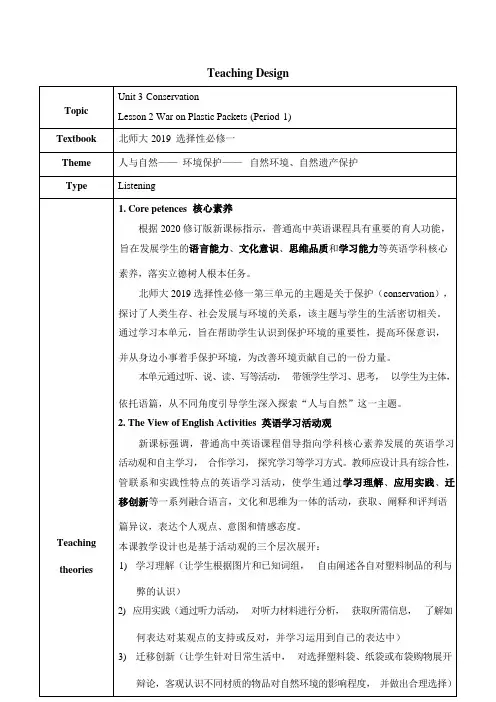
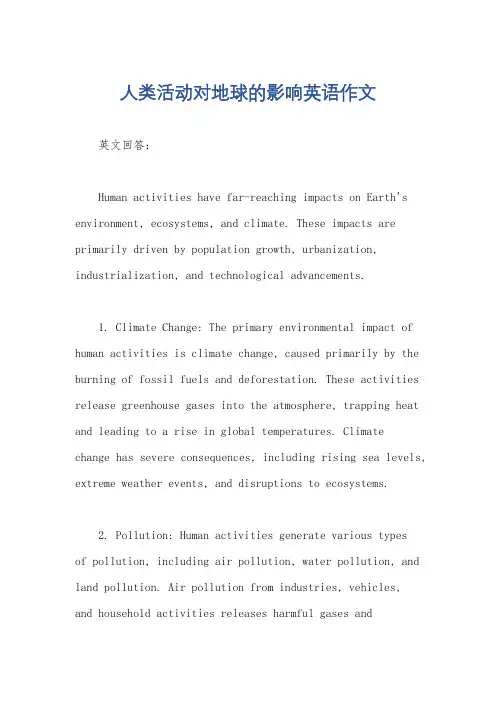
人类活动对地球的影响英语作文英文回答:Human activities have far-reaching impacts on Earth's environment, ecosystems, and climate. These impacts are primarily driven by population growth, urbanization, industrialization, and technological advancements.1. Climate Change: The primary environmental impact of human activities is climate change, caused primarily by the burning of fossil fuels and deforestation. These activities release greenhouse gases into the atmosphere, trapping heat and leading to a rise in global temperatures. Climate change has severe consequences, including rising sea levels, extreme weather events, and disruptions to ecosystems.2. Pollution: Human activities generate various typesof pollution, including air pollution, water pollution, and land pollution. Air pollution from industries, vehicles,and household activities releases harmful gases andparticles into the atmosphere, contributing to respiratory and cardiovascular diseases. Water pollution fromindustrial effluents, agricultural runoff, and sewage discharge can contaminate water bodies, making them unsafe for drinking, irrigation, and recreation. Land pollution stems from solid waste disposal, mining activities, and deforestation, degrading soil quality and ecosystem health.3. Deforestation: The clearing of forests for agriculture, logging, and development contributes to deforestation. Deforestation leads to habitat loss for wildlife, reduces biodiversity, and disrupts the water cycle. It also releases carbon dioxide into the atmosphere, further contributing to climate change.4. Biodiversity Loss: Human activities, such as habitat destruction, overexploitation, and pollution, threaten biodiversity. Many species face extinction due to poaching, habitat loss, and climate change. Biodiversity lossdisrupts ecosystems, impairs ecosystem services, and reduces the resilience of ecosystems to environmental change.5. Land Use Changes: Human activities have altered land use patterns significantly. Urbanization, agriculture, and industrial development have converted natural habitats into built environments, leading to habitat fragmentation and loss. These land use changes affect species distribution, ecosystem connectivity, and the provision of ecosystem services.6. Resource Depletion: The extraction and consumption of natural resources, such as fossil fuels, minerals, and timber, lead to resource depletion. These activities can cause environmental degradation, disrupt ecosystems, and contribute to climate change. Overreliance on non-renewable resources poses long-term challenges for sustainable development.7. Environmental Degradation: Human activities can degrade the environment through various means, such as soil erosion, water scarcity, desertification, and pollution. Soil erosion from agricultural practices, construction activities, and deforestation reduces soil fertility andecosystem productivity. Water scarcity, caused by climate change, pollution, and unsustainable water use, threatens human populations, agriculture, and ecosystems. Desertification, the conversion of productive land intoarid or semi-arid regions due to climate change, overgrazing, or unsustainable agricultural practices, can lead to land degradation and desertification.8. Public Health Impacts: Environmental degradation caused by human activities has significant public health impacts. Air pollution contributes to respiratory and cardiovascular diseases, while water pollution can lead to waterborne diseases and sanitation-related illnesses. Deforestation and habitat loss can increase the risk of zoonotic diseases, where animal diseases are transmitted to humans.9. Social and Economic Impacts: Environmental degradation and resource depletion have social and economic consequences. Climate change can lead to economic losses from extreme weather events, sea-level rise, anddisruptions to agricultural production. Air pollution andwater pollution can impact human health and productivity, leading to healthcare costs and losses in economic output. Biodiversity loss and habitat destruction can affect livelihoods, cultural heritage, and recreational opportunities.10. Future Threats: The impacts of human activities on Earth are projected to intensify in the future due to population growth, urbanization, and economic development. Climate change is likely to worsen, leading to more extreme weather events, rising sea levels, and ecosystem disruption. Pollution, deforestation, and biodiversity loss areexpected to continue, posing significant challenges to environmental sustainability and human well-being.中文回答:人类活动对地球的影响。
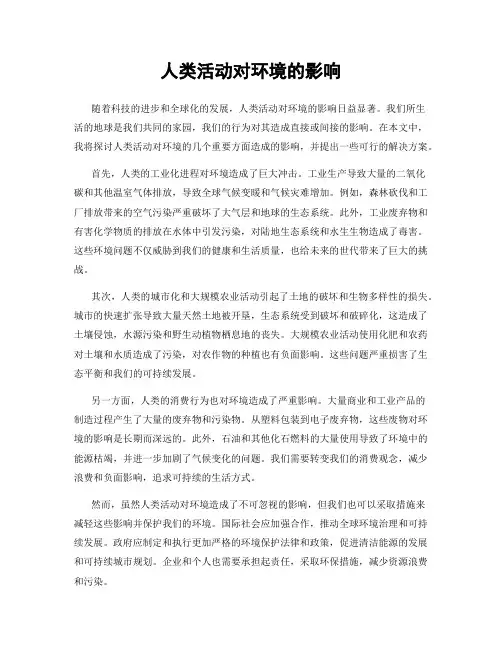
人类活动对环境的影响随着科技的进步和全球化的发展,人类活动对环境的影响日益显著。
我们所生活的地球是我们共同的家园,我们的行为对其造成直接或间接的影响。
在本文中,我将探讨人类活动对环境的几个重要方面造成的影响,并提出一些可行的解决方案。
首先,人类的工业化进程对环境造成了巨大冲击。
工业生产导致大量的二氧化碳和其他温室气体排放,导致全球气候变暖和气候灾难增加。
例如,森林砍伐和工厂排放带来的空气污染严重破坏了大气层和地球的生态系统。
此外,工业废弃物和有害化学物质的排放在水体中引发污染,对陆地生态系统和水生生物造成了毒害。
这些环境问题不仅威胁到我们的健康和生活质量,也给未来的世代带来了巨大的挑战。
其次,人类的城市化和大规模农业活动引起了土地的破坏和生物多样性的损失。
城市的快速扩张导致大量天然土地被开垦,生态系统受到破坏和破碎化,这造成了土壤侵蚀,水源污染和野生动植物栖息地的丧失。
大规模农业活动使用化肥和农药对土壤和水质造成了污染,对农作物的种植也有负面影响。
这些问题严重损害了生态平衡和我们的可持续发展。
另一方面,人类的消费行为也对环境造成了严重影响。
大量商业和工业产品的制造过程产生了大量的废弃物和污染物。
从塑料包装到电子废弃物,这些废物对环境的影响是长期而深远的。
此外,石油和其他化石燃料的大量使用导致了环境中的能源枯竭,并进一步加剧了气候变化的问题。
我们需要转变我们的消费观念,减少浪费和负面影响,追求可持续的生活方式。
然而,虽然人类活动对环境造成了不可忽视的影响,但我们也可以采取措施来减轻这些影响并保护我们的环境。
国际社会应加强合作,推动全球环境治理和可持续发展。
政府应制定和执行更加严格的环境保护法律和政策,促进清洁能源的发展和可持续城市规划。
企业和个人也需要承担起责任,采取环保措施,减少资源浪费和污染。
此外,教育也是改变人类行为的关键。
通过教育,我们可以提高人们对环境问题的意识,培养他们保护环境的责任感。

人类行为与社会环境对个人发展的意义下载提示:该文档是本店铺精心编制而成的,希望大家下载后,能够帮助大家解决实际问题。
文档下载后可定制修改,请根据实际需要进行调整和使用,谢谢!本店铺为大家提供各种类型的实用资料,如教育随笔、日记赏析、句子摘抄、古诗大全、经典美文、话题作文、工作总结、词语解析、文案摘录、其他资料等等,想了解不同资料格式和写法,敬请关注!Download tips: This document is carefully compiled by this editor. I hope that after you download it, it can help you solve practical problems. The document can be customized and modified after downloading, please adjust and use it according to actual needs, thank you! In addition, this shop provides you with various types of practical materials, such as educational essays, diary appreciation, sentence excerpts, ancient poems, classic articles, topic composition, work summary, word parsing, copy excerpts, other materials and so on, want to know different data formats and writing methods, please pay attention!一、人类行为对个人发展的意义。
人类行为对个人发展有着重要意义。
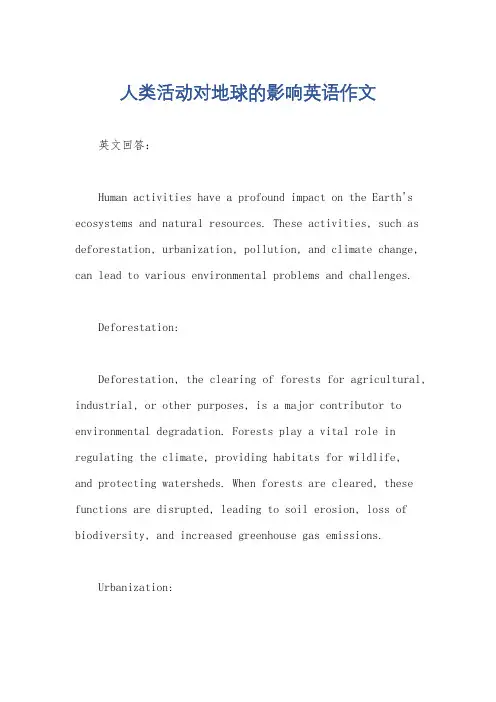
人类活动对地球的影响英语作文英文回答:Human activities have a profound impact on the Earth's ecosystems and natural resources. These activities, such as deforestation, urbanization, pollution, and climate change, can lead to various environmental problems and challenges.Deforestation:Deforestation, the clearing of forests for agricultural, industrial, or other purposes, is a major contributor to environmental degradation. Forests play a vital role in regulating the climate, providing habitats for wildlife,and protecting watersheds. When forests are cleared, these functions are disrupted, leading to soil erosion, loss of biodiversity, and increased greenhouse gas emissions.Urbanization:Urbanization, the growth of human settlements in urban areas, poses challenges to the environment. Cities are often characterized by high population densities, increased energy consumption, and waste generation. This can lead to air and water pollution, traffic congestion, and urban sprawl, which encroaches on natural habitats and fragments ecosystems.Pollution:Pollution, the release of harmful substances into the environment, is a major threat to both human and ecological health. Air pollution from vehicles, industries, and power plants can cause respiratory problems, heart disease, and cancer. Water pollution from industrial wastewater, agricultural runoff, and sewage can contaminate drinking water sources, harm aquatic ecosystems, and disrupt food chains. Soil pollution from industrial activities, mining, and landfills can damage plant growth and soil fertility.Climate Change:Climate change, primarily caused by the burning of fossil fuels and deforestation, is one of the most pressing environmental challenges facing the planet. Rising global temperatures are leading to changes in weather patterns, sea-level rise, ocean acidification, and increased frequency and severity of extreme weather events. These impacts can disrupt ecosystems, threaten human health, and undermine food security.Addressing these human activities and their environmental impacts requires concerted efforts from individuals, governments, and organizations. Sustainable practices, such as reducing deforestation, promoting renewable energy, and adopting cleaner technologies, can help mitigate the negative effects of human activities on the Earth. Additionally, raising public awareness, implementing environmental regulations, and investing in research and development are crucial for finding long-term solutions to these challenges.中文回答:人类活动对地球的影响。
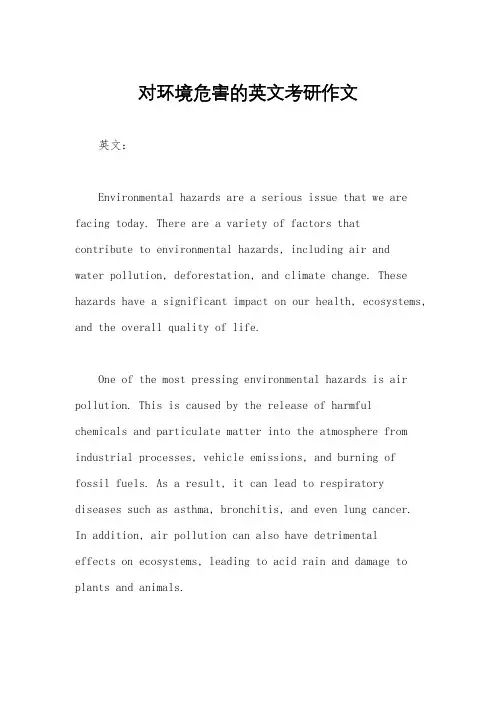
对环境危害的英文考研作文英文:Environmental hazards are a serious issue that we are facing today. There are a variety of factors thatcontribute to environmental hazards, including air andwater pollution, deforestation, and climate change. These hazards have a significant impact on our health, ecosystems, and the overall quality of life.One of the most pressing environmental hazards is air pollution. This is caused by the release of harmful chemicals and particulate matter into the atmosphere from industrial processes, vehicle emissions, and burning offossil fuels. As a result, it can lead to respiratory diseases such as asthma, bronchitis, and even lung cancer.In addition, air pollution can also have detrimentaleffects on ecosystems, leading to acid rain and damage to plants and animals.Water pollution is another major environmental hazard that poses a threat to human health and ecosystems. Industrial waste, agricultural runoff, and improper disposal of chemicals and waste products can contaminate water sources, making them unsafe for drinking and aquatic life. This can lead to waterborne diseases such as cholera and dysentery, as well as the destruction of marinehabitats and the extinction of certain species.Deforestation is also a significant environmental hazard that has far-reaching consequences. The clearing of forests for agriculture, urban development, and logging not only destroys vital habitats for countless species, but also contributes to climate change. Trees play a crucial role in absorbing carbon dioxide and releasing oxygen, so deforestation leads to an increase in greenhouse gases in the atmosphere, exacerbating global warming and its associated impacts such as extreme weather events andrising sea levels.Climate change is perhaps the most pervasive environmental hazard of all. The burning of fossil fuels,deforestation, and industrial processes have led to a significant increase in greenhouse gas emissions, resulting in a rise in global temperatures. This has far-reaching effects on the planet, including melting polar ice caps, changing weather patterns, and the loss of biodiversity.In conclusion, environmental hazards have a profound impact on our health, ecosystems, and the planet as a whole. It is crucial that we take action to address these issues, whether it be through reducing our carbon footprint, implementing sustainable practices, or advocating for policies that protect the environment. Only by working together can we hope to mitigate the effects of environmental hazards and create a healthier, more sustainable world for future generations.中文:环境危害是我们今天面临的一个严重问题。
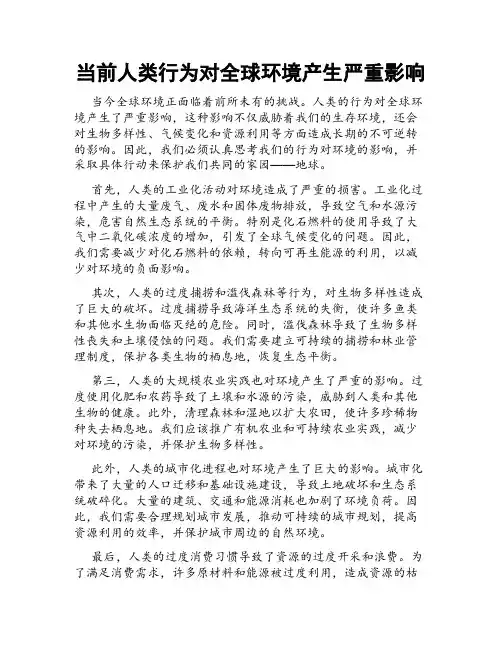
当前人类行为对全球环境产生严重影响当今全球环境正面临着前所未有的挑战。
人类的行为对全球环境产生了严重影响,这种影响不仅威胁着我们的生存环境,还会对生物多样性、气候变化和资源利用等方面造成长期的不可逆转的影响。
因此,我们必须认真思考我们的行为对环境的影响,并采取具体行动来保护我们共同的家园——地球。
首先,人类的工业化活动对环境造成了严重的损害。
工业化过程中产生的大量废气、废水和固体废物排放,导致空气和水源污染,危害自然生态系统的平衡。
特别是化石燃料的使用导致了大气中二氧化碳浓度的增加,引发了全球气候变化的问题。
因此,我们需要减少对化石燃料的依赖,转向可再生能源的利用,以减少对环境的负面影响。
其次,人类的过度捕捞和滥伐森林等行为,对生物多样性造成了巨大的破坏。
过度捕捞导致海洋生态系统的失衡,使许多鱼类和其他水生物面临灭绝的危险。
同时,滥伐森林导致了生物多样性丧失和土壤侵蚀的问题。
我们需要建立可持续的捕捞和林业管理制度,保护各类生物的栖息地,恢复生态平衡。
第三,人类的大规模农业实践也对环境产生了严重的影响。
过度使用化肥和农药导致了土壤和水源的污染,威胁到人类和其他生物的健康。
此外,清理森林和湿地以扩大农田,使许多珍稀物种失去栖息地。
我们应该推广有机农业和可持续农业实践,减少对环境的污染,并保护生物多样性。
此外,人类的城市化进程也对环境产生了巨大的影响。
城市化带来了大量的人口迁移和基础设施建设,导致土地破坏和生态系统破碎化。
大量的建筑、交通和能源消耗也加剧了环境负荷。
因此,我们需要合理规划城市发展,推动可持续的城市规划,提高资源利用的效率,并保护城市周边的自然环境。
最后,人类的过度消费习惯导致了资源的过度开采和浪费。
为了满足消费需求,许多原材料和能源被过度利用,造成资源的枯竭和环境的破坏。
同时,大量的废弃物的产生也对环境造成了压力。
我们需要转变消费观念,倡导节约资源和循环利用的生活方式,减少对环境的负担。
人类行为对环境的影响人类作为地球上唯一具有高级智慧的生物,影响着整个地球生态系统的平衡。
我们的活动对环境产生了严重的影响,如排放化石燃料导致的气候变化、森林砍伐导致的土壤侵蚀,等等。
这些行为正渐渐地从环境的角度来看产生着越来越严重的后果。
一种最常见的影响地球环境的行为是能源消耗。
现代工业已经离不开大量的能源,例如化石燃料和核能等。
这些能源的使用不仅导致了越来越严重的空气污染,更导致了全球气候变暖。
现在,人类已经面临减少对这些化石燃料的依赖和寻找新的能源来源的任务。
人类还通过林木采伐和大规模地开采矿物资源来改变着整个地球生态系统的平衡。
伐木导致的森林减少损失和采矿过程中产生的废水和气体的排放等,不仅会影响自然环境的平衡,还会威胁人类的生存环境,带来健康问题。
实际上,人类的行为还会对土地、空气和水资源产生深远的影响。
京津冀等地区已经严重受到了大气污染的影响,在许多其他地方,水污染的问题已经成为了新闻头条和社会问题,而土地的退化与荒漠化则会影响亚洲、非洲和南美洲等地区的人民生计。
人的行为对环境有很多不同的影响,不过我们可以采取一些措施来缓解这些影响。
首先,应该鼓励大家使用可再生资源,例如风能和太阳能等。
其次,政府应该更严格的监管化石燃料的使用。
再次,应该加强对林地管理和采矿环境的控制和监测。
最后,我们应该更加注重环保教育和生态经济的发展。
到目前为止,在人类行为和环境之间存在着一个钝化的错误观念。
我们常常认为,问题不在于我们的行为,而在于我们的方式,认为人类自然应该更加快速地发展。
但是,这样的行为机制实际上是忽略了我们的环境和未来。
我们需要把环保看做一个更重要的任务。
要形成持久的生态平衡,我们必须避免继续污染环境和消耗资源,并致力于保护我们共同生存的这个星球的生态。
改变行为方式和维护生态的可持续发展需要大家共同努力,而这一任务已经越来越迫在眉睫。
只有我们全球社会上下一起力量,才能创造一个更健康和繁荣的未来。
人类与气候之间相互影响英语作文How Humans and the Climate Affect Each OtherHi there! My name is Sam and I'm a 10-year-old student. Today, I'm going to teach you about the relationship between humans and the climate of our planet Earth. It's a very important topic that impacts all of us.What is Climate?First, let's talk about what climate actually means. Climate refers to the typical weather patterns in a certain area over a long period of time, usually 30 years or more. This includes things like:• Temperature (is it hot, cold, or somewhere in between?)• Pre cipitation (how much rain or snow falls?)• Wind (is it windy or calm?)• Humidity (how much moisture is in the air?)Climate is different from weather. Weather just describes what's happening with those things at a specific time, like a hot sunny day or a snowy blizzard. Climate looks at the bigger picture over decades.How Humans Impact the ClimateOkay, now let's look at how humans impact the climate of the entire planet. Humans do many things that release greenhouse gases like carbon dioxide and methane into the air. Greenhouse gases trap heat from the sun, causing temperatures to rise over time - this is called global warming.Some major ways humans contribute to climate change include:• Burning fossil fuels (oil, gas, coal) for energy in power plants, vehicles, factories etc.• Cutting down forests (trees absorb carbon dioxide)• Agriculture and livestock farming• Producing trash that releases methane in landfillsAll of these human activities over the last 150 years or so have caused a rise of almost 2°F (1°C) in global average temperatures so far. That might not sound like much, but small temperature changes can have huge impacts!Effects of Climate ChangeSo what happens when the climate changes due to human actions? Here are some of the big effects we are already seeing:• Rising sea levels from melting glaciers and ice caps, threatening coastal cities• More extreme weather like hurricanes, droughts, wildfires and heatwaves• Changes i n precipitation patterns leading to flooding in some areas and water shortages in others• Plants and animals going extinct because they can't adapt to the changing climateIt's pretty scary stuff! Scientists agree that humans are causing these climate changes and if we don't do something about it, the impacts will only get worse over time.How Climate Change Impacts HumansOf course, climate change doesn't just affect plants and animals - it also has major impacts on human societies and our way of life:• Low-lying islands and coastal cities may become unlivable due to rising seas• Farming and food supplies are disrupted, causing food shortages• More people are displaced from their homes by storms, droughts or other climate disasters• Human health is affected by air pollution, spread of diseases, heat waves, etc.• Costs go up to repair damages, relocate people, secure food and water, respond to disastersSo you can see it's a vicious cycle - we humans cause the climate to change in ways that then make life much harder for ourselves! That's why it's so important that we take action.What We Can DoThe good news is, there are lots of things we can do to reduce our impacts on the climate:• Use less energy by turning off lights, taking shorter showers, etc.• Walk, bike or take public transportation instead of driving• Recycle, reuse and cut down on waste• Support renewable energy like solar and wind power• Eat more plant-based foods and less meat• Plant trees to absorb carbon dioxide• Pick up litter and debris from beaches and parks• Spread awareness about climate changeEven small actions from every person can make a big difference when added up across the whole world. Our leaders also need to make smart policies to transition to cleaner energy and more sustainable practices.If we all work together, we can reduce our carbon footprint and help slow down climate change. Earth is an amazing planet and the only home we've got - we need to take care of it! What we do today will shape the environment for kids like me growing up. I hope you'll join me in being part of the solution.Thanks for reading, and remember - small steps make a big impact on our climate!。
什么是人类行为对环境的影响
随着社会的发展和科技的进步,人类的行为形式和方式也在发生改变,从而对环境产生了深远的影响。
即便没有科技的发展,人类也会通过
其自身的行动而直接或间接地影响到环境。
本文旨在详细阐述人类行
为对环境的影响:
由于科技进步,人类产生了大量污染物,这些污染物称为温室气体,
如二氧化碳,甲烷,氮氧化物等,它们会阻碍太阳辐射在地球表面反射,温室效应随之增加,从而引起全球温度的上升。
长期的全球变暖
严重影响了地球的生态平衡,使地球变得更加温暖、潮湿。
日益恶化的环境阻碍了植物的生长。
植物的生长通常受到太阳的直接
影响,如果温室效应和全球变暖过程继续发展,气候状况会变得更恶劣,太阳辐射强度会减弱,植物不易受光,从而影响植物的生长。
人类活动产生大量的污染物,大量的污染物和废物被直接或间接地抛
进海洋,这造成了海洋的水质变差,改变了海洋的物种组成,丧失了
许多原始物种,减少了海洋生物的多样性。
传统农业,林业,渔业等运动被大量替代,被越来越多人参与,大规
模的改造和开发侵入了自然植物,损害了野生动物和植物的生存,使
大片自然生态系统面临报废。
油井,机动车排放的大量污染物,在一个特定的地区积累变多,改变了大气层的环境,使空气变得污浊,臭味扑鼻,有害的气溶胶伴随大气随处可见。
在长期暴露在这样的污染物中,人类和环境的健康受到严重威胁。
以上就是人类行为对环境的影响,虽然人类行为的扩张给环境造成了不可逆转的破坏,但在科技发展的帮助下,我们可以采取相关措施减少环境污染,进而营造一个更加良好的生存环境与绿色环境。
人类行为对自然环境的影响自然环境是人类赖以生存的基础,然而,随着人类社会的不断发展,人类行为对自然环境造成的影响也越来越大。
本文将从资源消耗、生态破坏和气候变化三个方面探讨人类行为对自然环境的影响,并提出相应的解决方案。
一、资源消耗人类对自然资源的需求量日益增加,导致资源消耗速度加快。
首先,能源资源的过度开采和使用对环境造成了巨大的破坏。
煤炭、石油和天然气等化石燃料的大规模使用导致空气污染和全球变暖,严重影响了生态平衡。
其次,水资源的过度开采和污染也给生态系统带来了威胁。
许多地区的河流和湖泊已经干涸或受到严重污染,导致生物多样性减少,生态系统失衡。
解决这一问题的关键在于推动可持续发展。
首先,我们应该加大对可再生能源的研发和利用,减少对化石燃料的依赖。
同时,应该加强水资源管理,限制过度开采和污染,推动节水措施的实施。
此外,还应该加强对资源的合理利用和循环利用的研究,减少资源浪费。
二、生态破坏人类的生产和生活活动对生态环境造成了严重破坏。
首先,森林的砍伐和土地的过度开垦导致了生态系统的破碎化和生物多样性的丧失。
许多珍稀濒危物种因此失去了栖息地,生态平衡受到了严重破坏。
其次,水域和海洋的过度捕捞导致了渔业资源的枯竭和生态系统的崩溃。
大量的废水排放和化学物质的使用也导致了水质污染,对水生生物造成了威胁。
为了保护生态环境,我们需要加强环境保护意识的普及。
政府应该出台相关法律法规,加强对生态环境的监管和保护。
同时,我们应该推动可持续农业和林业的发展,采取措施保护森林和土地资源。
此外,应该限制过度捕捞,推动渔业资源的可持续利用。
最重要的是,每个人都应该意识到自己对生态环境的责任,从小事做起,减少对环境的破坏。
三、气候变化人类的工业化和能源消耗导致了大量的温室气体排放,进而引起了全球气候变化。
气候变化对生态系统和人类社会造成了巨大的影响。
首先,气候变暖导致了冰川融化和海平面上升,威胁到了沿海地区的居民和生态系统。
人类行为对生态环境的影响与调控人类的行为对生态环境有着重要的影响,包括对自然资源的开发利用、大规模工业化和城市化等。
随着人口的增长和经济的快速发展,这些影响变得越来越明显。
然而,我们也意识到必须采取措施来调控和管理这些影响,以实现可持续发展。
本文将探讨人类行为对生态环境的影响以及可能的调控措施。
第一部分:人类行为对生态环境的影响1. 自然资源开发利用人类对自然资源的开发利用对生态环境产生了巨大影响。
众所周知,随着人口的增长和经济的发展,对能源、水资源、土地等自然资源的需求大大增加。
过度的开发和利用导致了生态系统的破坏和物种的灭绝,例如森林砍伐导致的生物多样性减少,矿山开采引发的土壤和水污染等。
2. 工业化和城市化工业化和城市化是人类行为对生态环境影响最显著的方面之一。
大规模的工业生产和城市建设导致了大气污染、水污染和土地退化等问题。
废弃物的排放、工业废气的排放和汽车尾气的排放不断损害着环境的健康。
3. 农业生产农业是人类生活的基本产业,但其现代化生产也对生态环境产生了一系列影响。
过度使用化肥和农药导致土壤质量下降和水体污染。
大规模养殖业也会引起水体富营养化、养殖废弃物的处理问题等。
第二部分:人类对生态环境影响的调控措施1. 提倡可持续发展可持续发展是解决生态环境问题的关键。
人类需在经济发展的同时保护生态环境,确保资源的可持续利用。
政府和各界应加强宣传教育,提高人们对可持续发展的认识,倡导节约能源、减少污染、推进循环经济等环保行动。
2. 促进绿色产业和清洁能源为减少工业对生态环境的影响,应推广绿色产业和清洁能源。
加大对可再生能源开发的投入,推动绿色技术的研究与应用,减少污染物排放,改善工业环境。
3. 强化环境保护法规建立健全的环境保护法规是调控人类行为对生态环境的重要手段。
政府应加强环境监管,对破坏环境的行为进行严格处罚。
同时,我们也需要提高法律意识,自觉遵守环保法规,从个体层面推动环境保护工作。